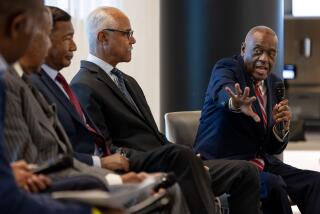MOVIE REVIEW : ‘Glory’ an Epic of Wanting Proportions
“Glory” (at the Cineplex Odeon Century City) is an eloquent, heart-tugging Civil War epic about the first black infantry regiment to march off to battle for the Union. And epic is the word. Not since John Ford has a film maker created such dramatic large-scale Civil War battle scenes in a major theatrical film.
However, without its fresh focus on the role of the black soldiers in the Civil War, “Glory” would seem old-fashioned in its unabashedly sentimental conflict between good and evil. What makes it as rousing as it is is our awareness that the Civil War was far from a decisive victory for blacks; it was more like the first round in a struggle for freedom and equality that continues more than a century later.
“Glory,” which is a touch self-congratulatory, eschews the ironic for the heroic, even though much of what it depicts is inherently, even cruelly ironic, especially in the spectacle of men who, among their first acts as free men, volunteered to pay for their freedom with their lives.
Written with fervor by Kevin Jarre from various sources and directed passionately by “thirtysomething” co-creator Edward Zwick, “Glory” proceeds confidently in straight-ahead fashion with some astute observations along the way.
Matthew Broderick stars as an actual Boston Brahmin abolitionist, Col. Robert Gould Shaw who, though wet behind the ears, doesn’t flinch when he is asked to lead the 600-man 54th Massachusetts Voluntary Infantry, the first black Civil War unit. Broderick gives a flawless performance as this quintessential Victorian idealist, a prim, diminutive man with a Van Dyke beard, who has to dig into himself to find the reserves of courage and leadership.
Broderick shows us Shaw’s growth, his learning how to temper his reflexive severity as he gains self-confidence. Keeping him in perspective is his less serious, less focused--but no less decent--friend, Maj. Cabot Forbes, played by a very likable Cary Elwes.
The film makers wisely devote the first of the film’s two hours to the regiment’s training in a camp in Massachusetts. As the irate Shaw finds he must combat racism that delays uniforms, rifles and even shoes for his black soldiers, we learn to know a group of them. They are: Trip (Denzel Washington), a bitter, cynical young field hand from Tennessee; Rawlins (Morgan Freeman), a quiet, older man, a natural leader and peace-keeper; Sharts (Jihmi Kennedy), a sweet-natured, sharp-shooting innocent from South Carolina; and Thomas Searles (Andre Braugher), a Boston intellectual and freed man who is best friends with Shaw and Forbes.
Shaping the men up is their Irish sergeant-major (John Flinn) who insists, not quite convincingly, that he is tough on blacks not because he is a racist but because he wants them to have a chance at surviving. There are unbilled appearances by Jane Alexander as Shaw’s mother, the recipient of many of his letters, and Raymond St. Jacques, a dignified Frederick Douglass.
These actors, starting with Washington and Freeman, are distinctive and involving. Braugher’s Searles, however, is one of the film’s primary strengths, as he tries desperately to meet the psychological as well as physical rigors of his predicament. Braugher’s Searles is nicely balanced by Cliff DeYoung’s nasty, corrupt Union colonel, a racist who exploits the war for profit.
As it proceeds to its magnificent climactic battle sequence in Charleston harbor, “Glory” reminds us that the Civil War was fought for many reasons. At the same time the film, like “Cry Freedom” and “A Dry, White Season,” feels it must tell of a black struggle from the perspective of a sympathetic and noble white. For all that is commendable about “Glory,” you nevertheless wish you were experiencing it from the perspective of Trip, a man who gets put down constantly for telling the truth, but who is obliged by the script to shape up and get swept up in the film’s selfless heroism, just like everyone else.
Denzel Washington, a born star still waiting for that breakthrough part, brings an anguish to Trip that seems to go beyond the role itself. At times Trip seems a bit too contemporary in his militance, but then he is not as focal, not as developed as he might be.
Remarkable as a period piece and for Freddie Francis’s vivid cinematography, “Glory” (rated R for battlefield violence) is an impressive accomplishment for a director whose only previous theatrical film was the yuppie comedy “About Last Night . . .” Although “Glory” is splendid for what it is, it does leave us wanting more.
‘GLORY’
A Tri-Star presentation. Producer Freddie Fields. Director Edward Zwick. Screenplay Kevin Jarre; based on the books “Lay This Laurel” by Lincoln Kirstein and “One Galant Rush” by Peter Burchard and the letters of Robert Gould Shaw. Music James Horner; featuring the Boys Choir of Harlem. Camera Freddie Francis. Production deisgner Norman Garwood. Costumes Francine Jamison-Tanchuck. Co-producer Pieter Jan Brugge. Sound designer and supervisor Lon E. Bender. Stunt coordinator Bob Minor. Special effects coordinator Phil Cory. Special visual effects by Syd Dutton and Bill Taylor. Makeup effects created by Kevin Yagher. 2nd unit director Dan Lerner. 2nd unit camera David Wagreich. Film editor Steven Rosenblum. With Matthew Broderick, Denzel Washington, Cary Elwes, Morgan Freeman, Jihmi Kennedy, Andre Braugher, John Flinn, Cliff De Young, Raymond St. Jacques.
Running time: 2 hours, 2 minutes.
MPAA-rated: R (younger than 17 requires accompanying parent or adult guardian).
More to Read
Only good movies
Get the Indie Focus newsletter, Mark Olsen's weekly guide to the world of cinema.
You may occasionally receive promotional content from the Los Angeles Times.










